No lengthy intro for this one. I just suddenly realized an obvious combination that somehow hadn't occurred to me before: full Tradition then Jesuit Education. Only Poland can do this; no other civ can get 11 policies before Rationalism. Any other civ could only do Tradition partially, but there's no point to that because all Tradition's power is in the finisher and any partial plan is better into Liberty instead.
(Weird how flipping Babylon from Tradition to Liberty didn't excite me, but switching Poland from Liberty to Tradition does. Every plan just keeps leading me back to Poland-envy. Every game induces this logic at some point: "I wish I had X here. Hey, Poland could do X. AND SIX OTHER THINGS TOO.")
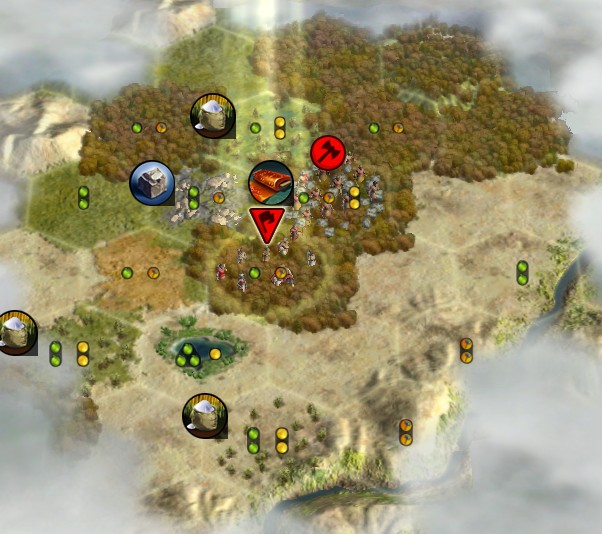
I burn through dozens or hundreds of map rolls for every report you see here. Many look like this. Some desert, but it's only going to be enough if there's a lot more past those hills. Or a map might have expansive desert, but the right elements for a capital (hill plant, river, 3-food tile and more hills in first ring) don't always come together in one spot. Each time I see a start like this, I move the settler to take a look, ready to just click restart if the move doesn't pay off.

Umm, that qualifies! 
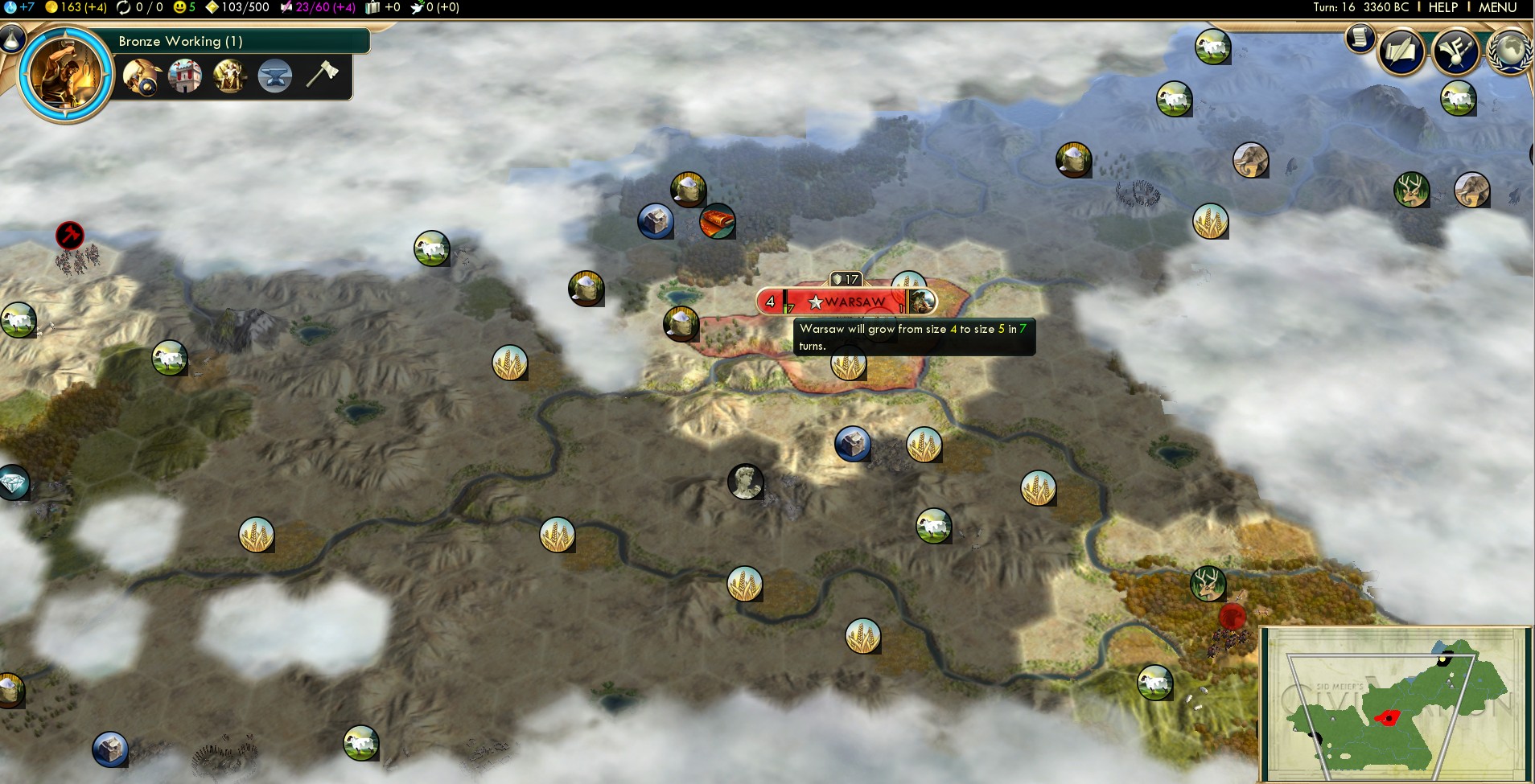
With triple wheat, of course I grew the capital to size 2 then 3 manually. A population ruin went to 4, and I kept going even to size 5 as well. Remember that the hammer opportunity cost of growing is lower than the apparent food cost when you're comparing 3-food to 2-hammer tiles. The opportunity cost of early hammers into scouts would be paid back by working the additional hills to produce the starvation settlers.
Ruins popped Mining on turn 3, culture on turn 8 (by the ruin visible south of Warsaw) which was perfect, t9 70g, map, t13 spearman upgrade which is also great, t15 55g, t15 the aforementioned population to size 4 perfectly timed, t16 culture again booyah, archer upgrade, ...
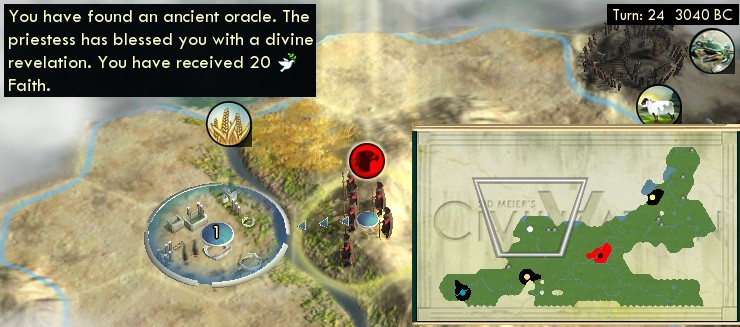
and on turn 24 our blessed lady of faith and the game is on. t26 80g to buy the worker, map, t30 third culture ruin, t34 Trapping from the last relevant ruin.
Research: I got tempted by the early Mining pop into researching Bronze Working right away in hopes of finding iron at the capital. This was something of a mistake, should have done Archery to put out an archer for defense right after the scouts. I built three scouts - monument - worker, pushing out that last (and buying one as usual) unescorted. I lost about six worker-turns between the two of them having to dodge some barbarians before getting an archer out to cover them. But that's no real loss as that six turns was how long it would have taken to do an archer before that worker anyway.

Also relevant from that list of ruins results was the spearman upgrade for the starting warrior, which allows seizing tribute from a city-state with the starting strength value of 11 and no units. Here I got two right next to each other. These provided an important shot of gold to buy the hills needed to build settlers.
Culture: turn 8 the Tradition opener, t16 Oligarchy, t26 Legalism, T40 Monarchy because Landed Elite doesn't help for starvation settlers.
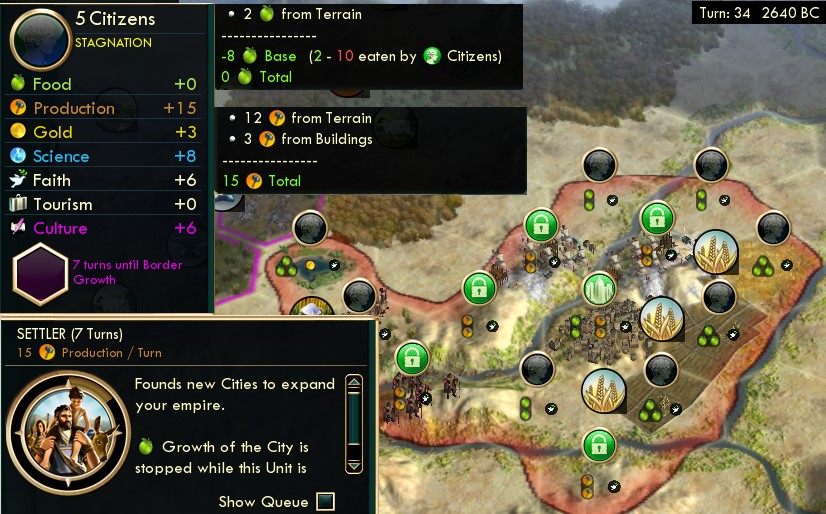
That's the starvation settler setup. Not as spectacular as Collective Rule or Shoshone games can be, but solidly productive enough.
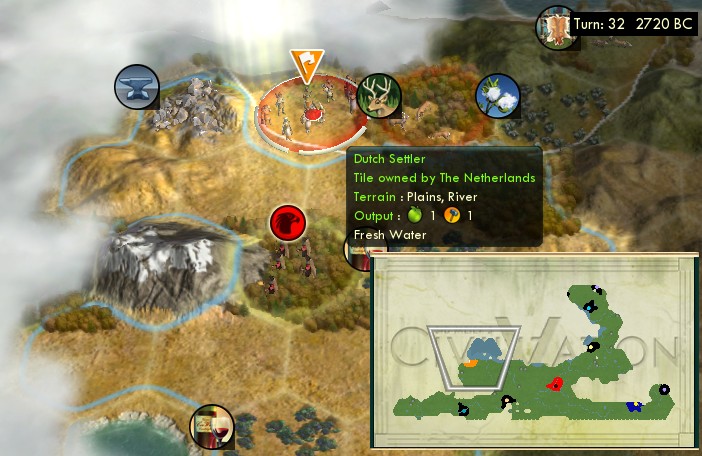
I have to relate this episode, although it has nothing to do with the main narrative. My scout found a stealable Dutch settler here.
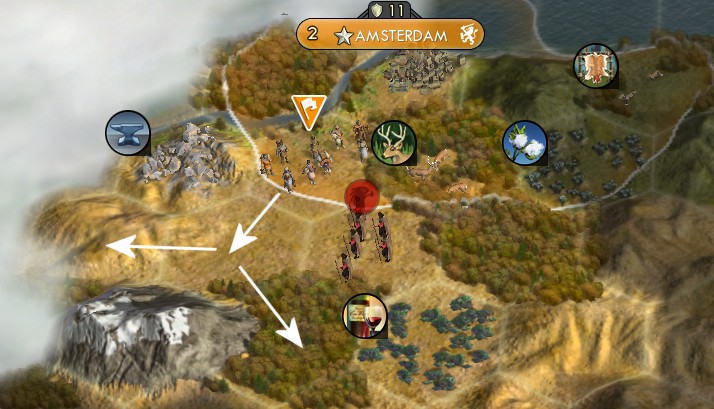
However, I cleverly decided to wait a turn. The reason is to grab the settler without walking into firing range of the city. The scout probably wouldn't die from one shot, but this way it can keep scouting without spending a chunk of time healing. If I put my scout here as shown, the settler's only sensible moves are SW-W or SW-SE as indicated, either of which allows my scout to take it next turn without entering the city's firing radius. (The settler is not moving southeast, or else its first move would have been onto the deer tile, defensive terrain.)
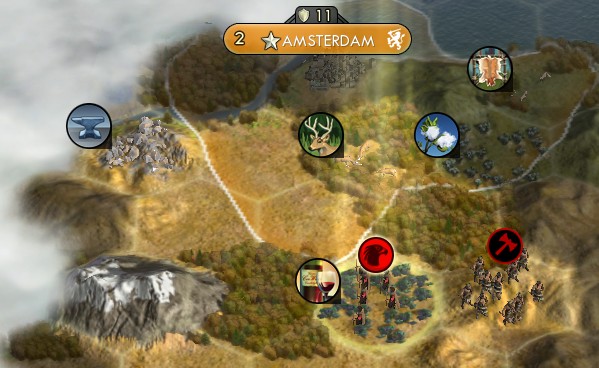
Except I didn't count on this: the city expanded borders right then right there to kick my scout back over a tile! And now the settler is out of sight and reach.
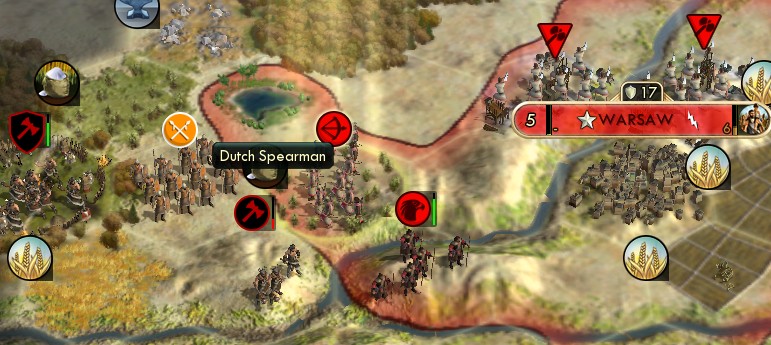
Also at this moment there was a Dutch spearman right by my home. That would have been quite a headache if I had declared war, guess it was a good thing I hadn't. And then even while my scout was still trying to steal their settler, the Dutch friended me! OK, so no settler steal.
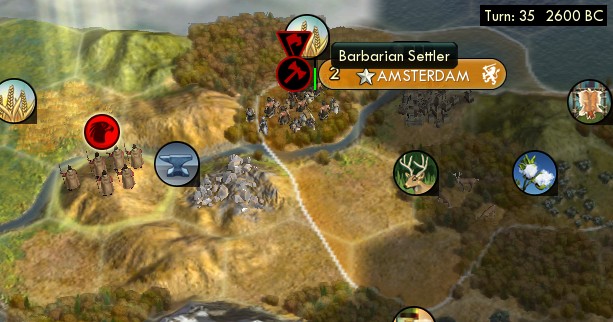
Well, then I regained sight of the settler -- captured by a barbarian!
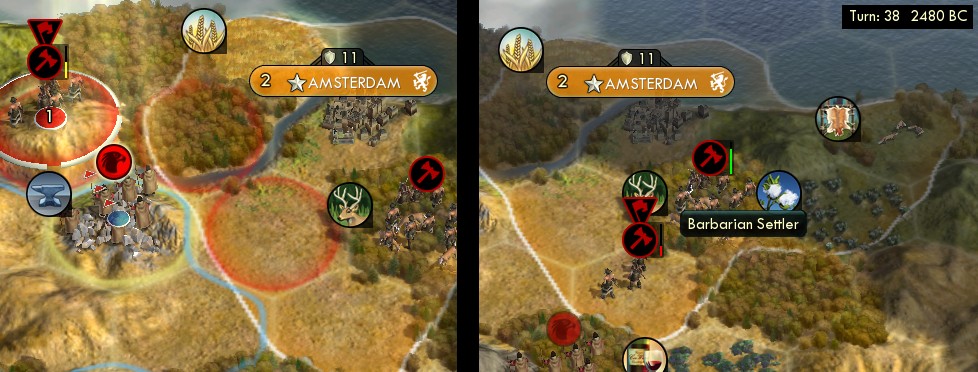
It lurched west, then east. All the time my scout was watching and kept hoping Amsterdam would weaken the settler's escort enough for my scout to kill it. Unfortunately it kept shooting the other brute closer to the city instead of the escort.
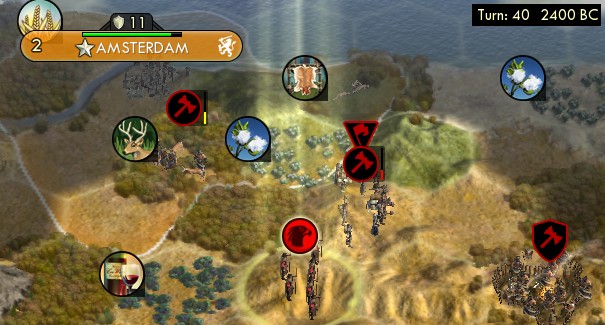
From this position the settler would end up in the camp where my single scout couldn't kill the defender to get it. So finally I abandoned this effort and just moved along instead.
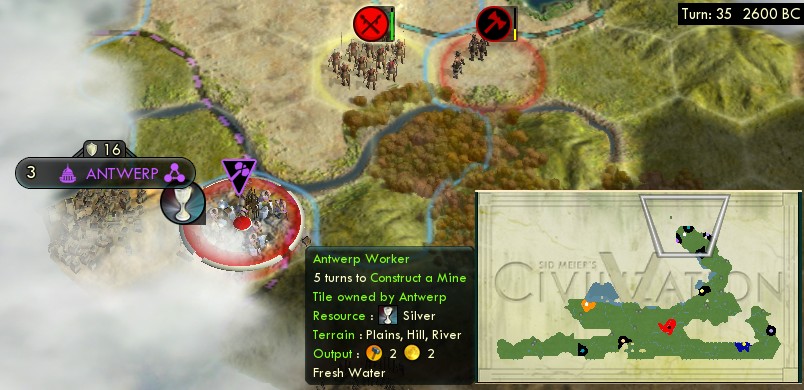
But meanwhile, on the other side of the map I was making up for that comical episode in spades. First a classic worker steal from a filthy mercantile city-state. A bit far away from home, a third of the way around the rim of the inland sea, but grab it now because bird-in-hand and all that.
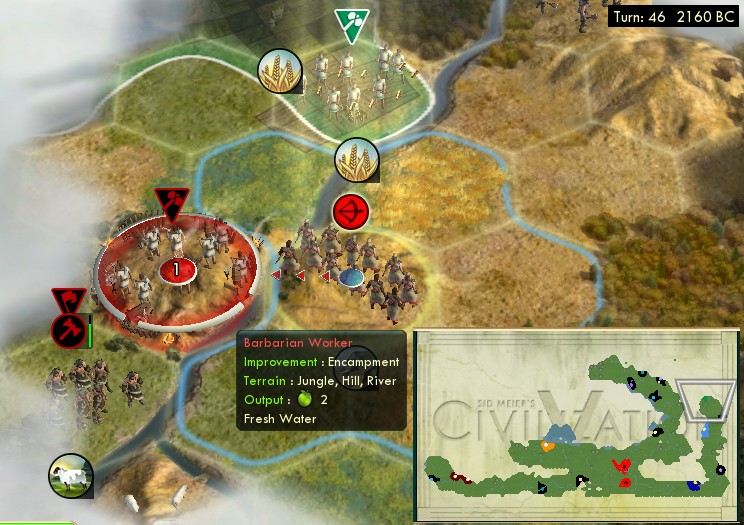
Next I lucked out here with a barbarian abandoning his camp to grab that settler. I happily snatched the worker for myself. I chased the brute in hopes of grabbing the enslaved settler too...
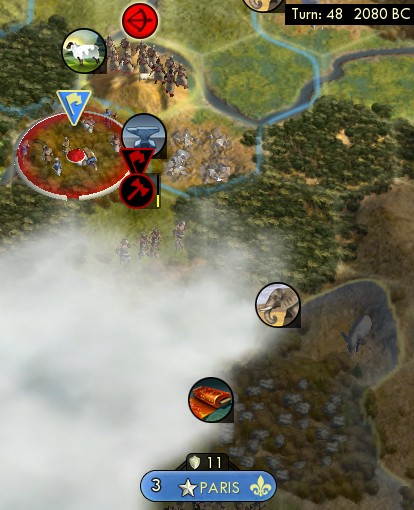
but look at that, a French settler free for the taking! Worth declaring war for it so I did.
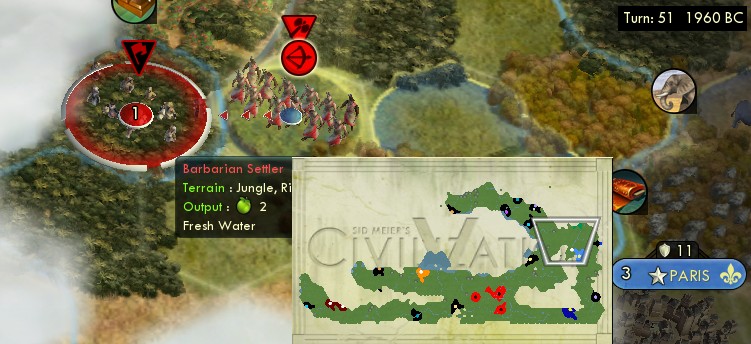
And I chased down and killed the brute to capture and keep the settler too.
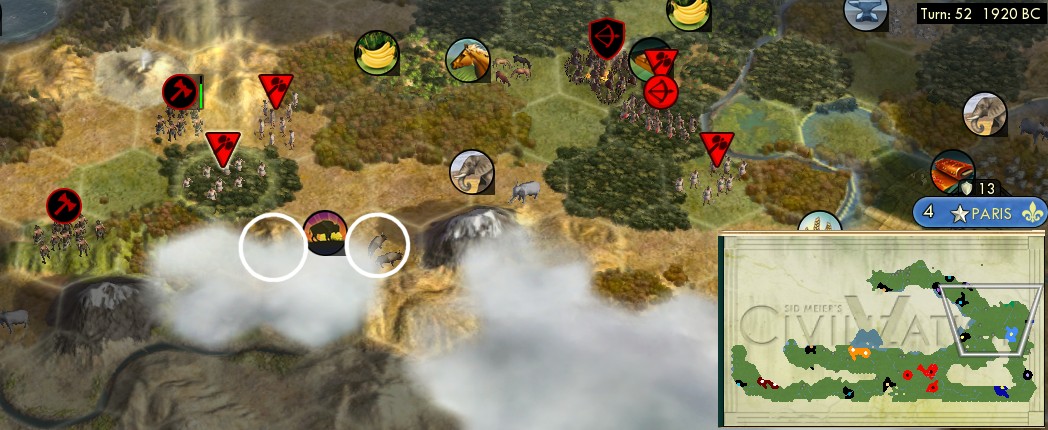
Getting four stolen workers all home intact would be quite a challenge, though. A single worker can usually make it by "radaring" into nearby territory to locate and avoid barbs, but four workers would be bumping into each other competing for limited safe spots. The two on the left could only hope the two circled tiles were safe (they were). The archer had to turn back from exploring and help guide all these guys home.
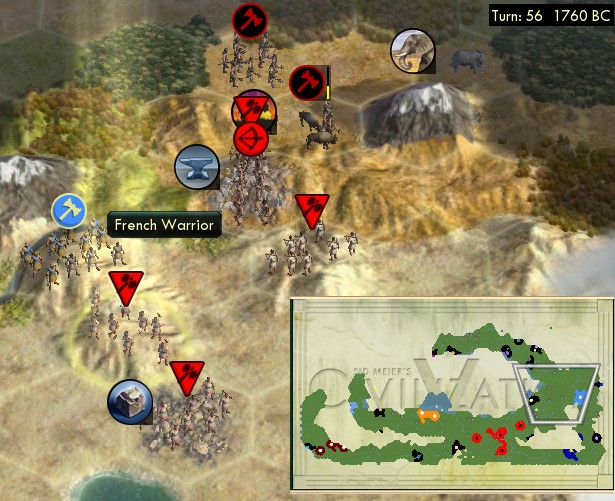
The next twenty turns all looked like this with that single archer desperately trying to cover a herd of four vulnerable workers. I had to take peace with France here or that warrior would screw up everything. But this was actually quite a bit of fun, an entertaining mini-game that I haven't seen before in Civ.

In the peace treaty I got to pull this trick that I'd read about but hadn't come together for me before. Use the peace treaty to sell resources for cash (which otherwise requires a friendship agreement.)
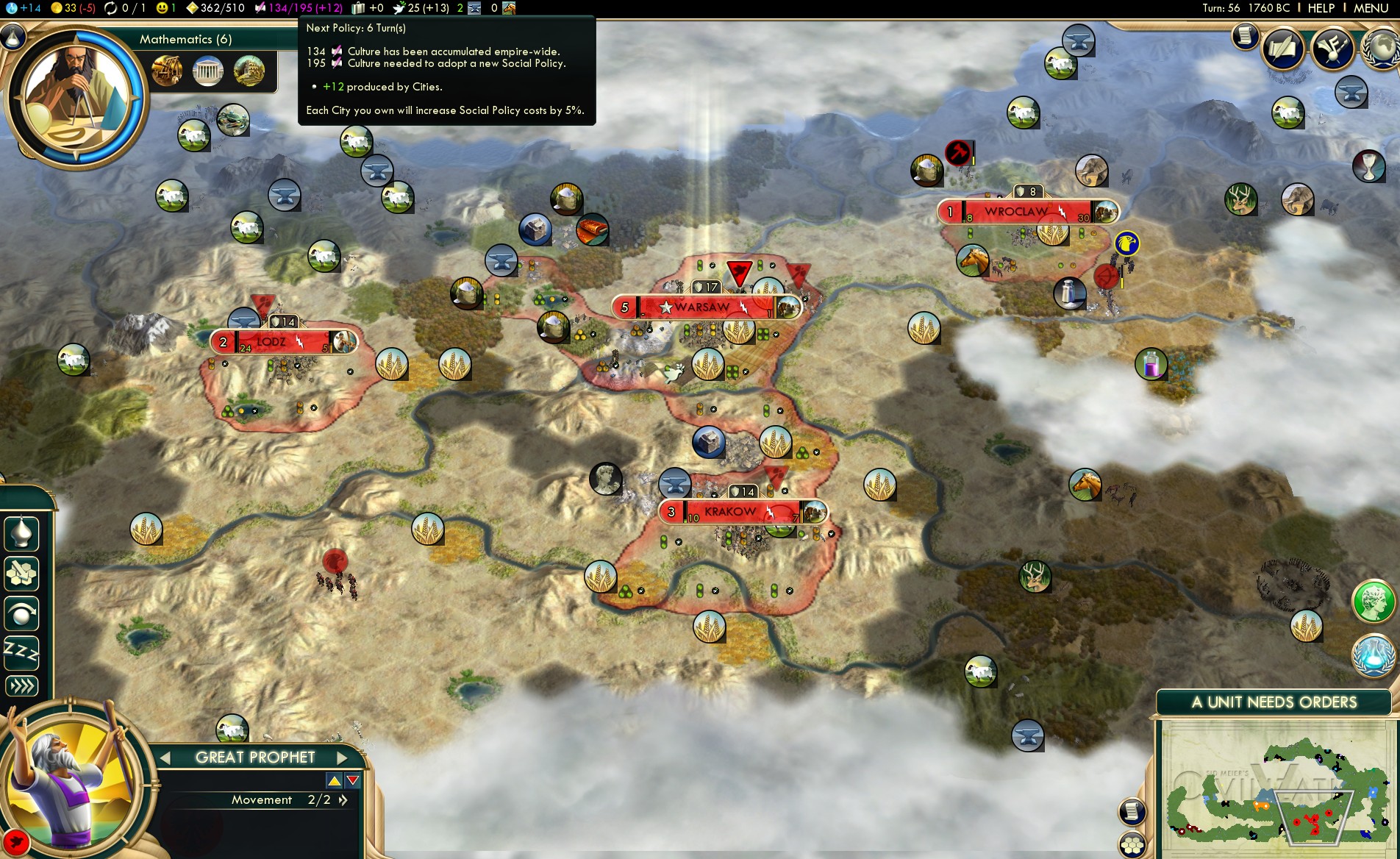
Back to the home front. I built three settlers from my capital, then returned to infrastructure there. Lodz' location looks a bit questionable off the river and with no luxuries, but it's poised for fast development, to grow on the oasis and two wheat then work three hills including iron. Krakow and Wroclaw are standard plays for some big arrays of resources.
The current policy is timed together with research for the classical-era Solidarity freebie. Those would finish together to get both Landed Elite and Aristocracy to finish Tradition on turn 61.
This game was actually my third try at the Poland Tradition-Piety plan. One failed for missing Jesuit Education by two turns. Another just developed too slowly (Education at turn 115) and I saw how to put it together better.
The big point this plan must leverage is Poland's unmatchable blazing speed to the Tradition finisher, fifteen or twenty turns faster than any other civ. In the incomplete games, I wasted this. I crippled city growth by building more settlers just as the free aqueducts arrived. Really, this plan wants to just play as a classic Four-City Tradition civ for a while. Let these cities grow on the food multipliers before pausing to build more settlers. My previous tall Rome Tradition game came up short in the end, but in the meantime did reach Civil Service and Education as fast as any other game did.
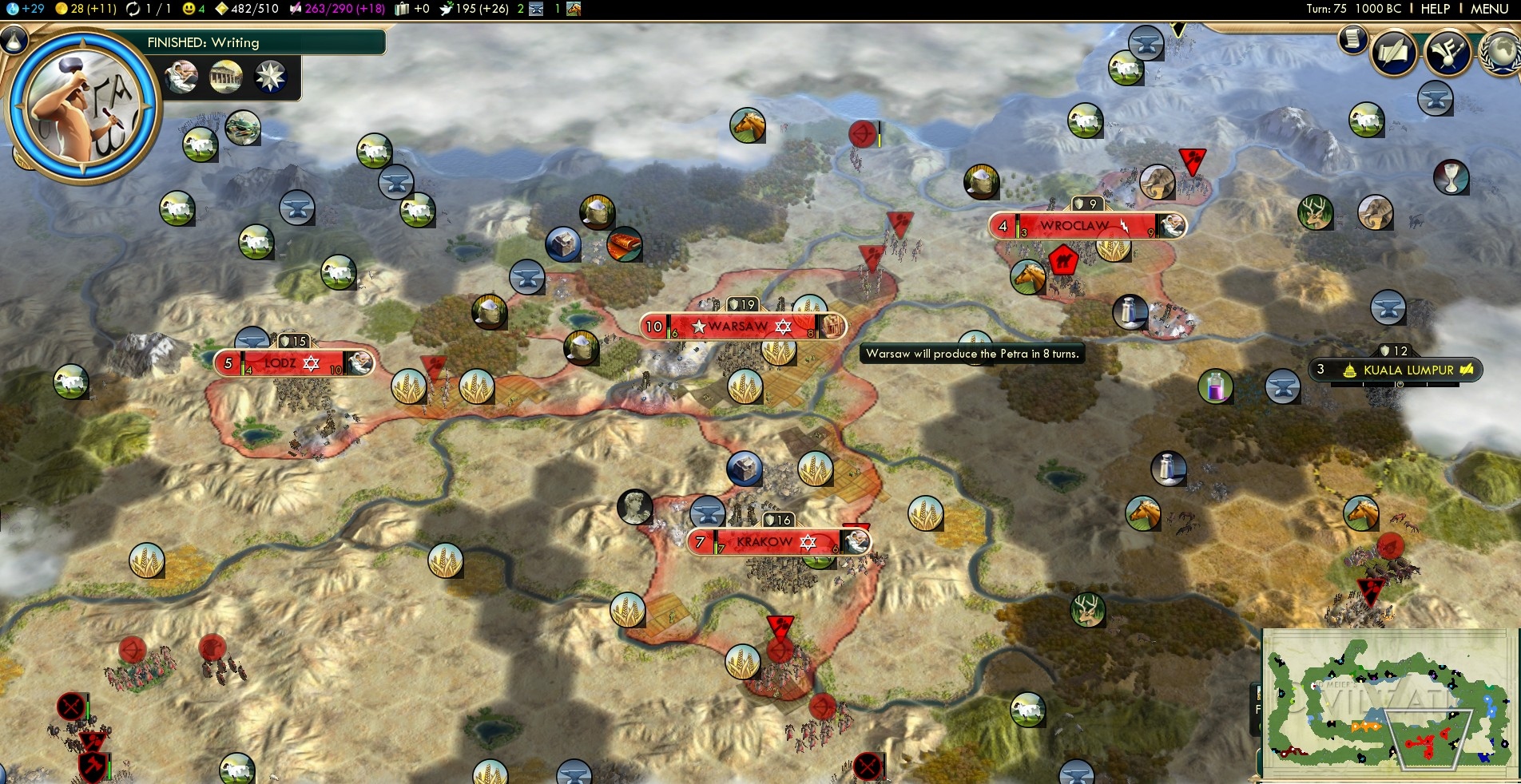
My build order with these first four cities came out quite satisfying. They built granaries first, then all started libraries together right here (the capital after Petra.) I'd intended to also produce some workers, but didn't need to when that gang of stolen workers finally arrived home. At my usual checkpoint date of 1000 BC here, 26 population isn't great by the standards of Liberty games, but is about as good as you can do for Tradition with the growth still in front of you.
I also discovered in the previous games that this plan had to go for Philosophy before Civil Service. Because we needed to start the Oracle early so it would complete when we reached the medieval era, in order for the Oracle and Solidarity freebies to together reach Reformation. Since Philosophy is necessary and we had a four-city build with libraries, the National College follows. Warsaw smoothly completed that right after Petra here.
Four cities isn't enough to go to endgame of course. At the least, we want seven or eight cities capable of putting out a Great Scientist each. This means they need to be founded in time to build a library before Education so they can receive the Jesuit university right away. There is one particular right time to build these settlers: while researching Civil Service. Just before the farm food bonus kicks in is the least wasteful time to halt growth for the settlers, and just after the farm food bonus is the right time to plant those cities to grow up to size quickly and also for the existing cities to resume growth.
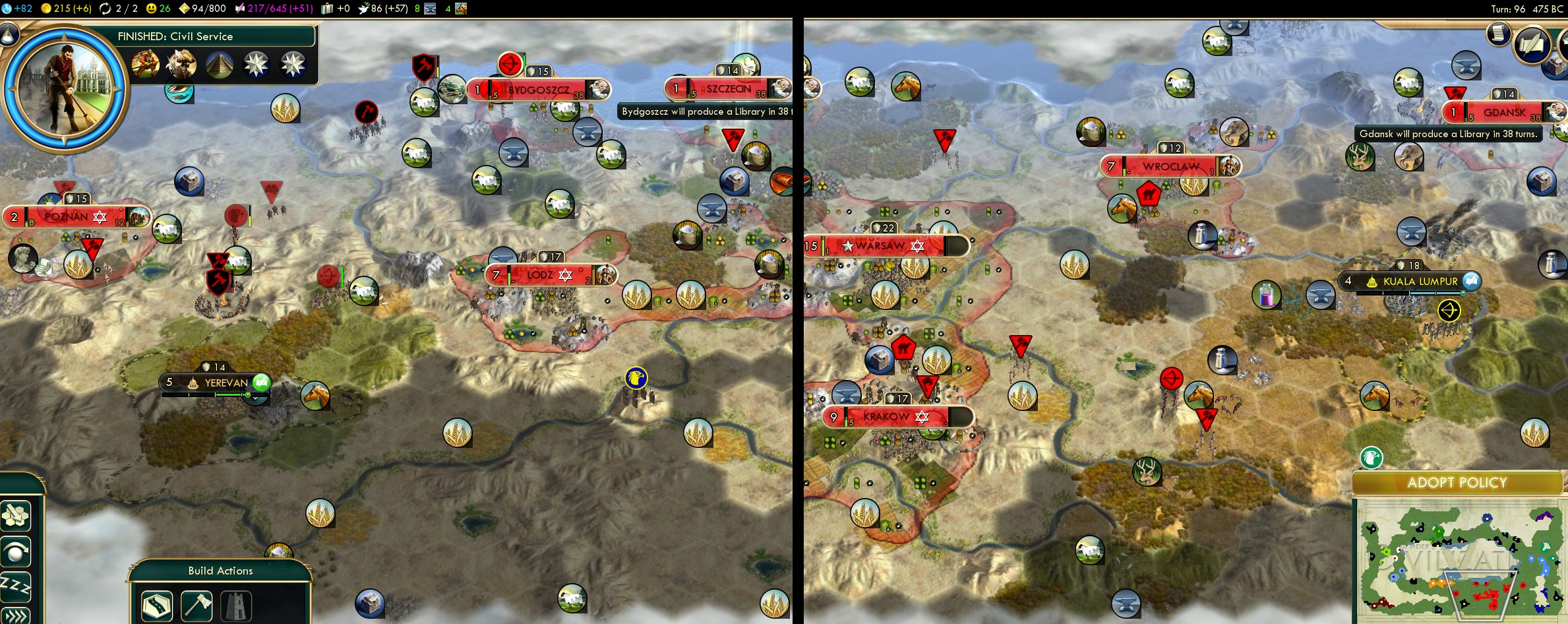
I had intended to built one settler each from Lodz, Krakow, and Wroclaw; but they were doing so well and I found myself with such a bubble of happiness (+26!) that I built two from each and a third in Lodz. I'd also put together enough money to buy one which had become Poznan, which was worth the reach to grab a new luxury. A subtle advantage of Tradition / disadvantage of Collective Rule: you can buy/build the settlers closer to where they will be going rather than walking them all from the capital.
A not-subtle advantage of Tradition: the capital doesn't get tied up building settlers forever because you can build them elsewhere. Here Warsaw built its granary and watermill before Petra (usually those come after), which made a substantial difference on its size and strength during and after building that wonder.
Also an advantage of tall Tradition: with fewer cities for anger and Monarchy for happy, the happiness Golden Age comes quickly. The +20% hammer boost also saved a couple turns for building the settlers.
So this is the summary of the development plan here:
- Build three starvation settlers from the capital to establish the Tradition Four asap
- Then get the capital growing and developing with granary, watermill, Petra
- Grow the other three Tradition cities
- Tech order is Currency (Petra), Philosophy (NC and Oracle), Civil Service, Education, Engineering
- Build more settlers just before Civil Service and plant the cities just after
- New cities build library first in order to receive the Jesuit university right away at Education
- New cities build aqueduct second, to catch up on size with maritime and caravan food
I'd discovered in the Babylon Jesuit game that it's actually OK for cities to be founded somewhat late, even up to around turn 100. The Jesuits take care of the education. It's OK if they're small for a while as long as they're running a university. Maritime and caravan food will do the rest and catch these cities up to full levels of population and infrastructure by the time they get to public schools. It can actually be good to found these cities a bit slower, as that allows more time and breathing room to ramp up happiness with connected luxuries and pagodas and city-states.
I also pushed hard on making sure to bring two workers to each of the new city sites while the Tradition core then built replacements. That made quite a difference on bootstrapping the new cities too.
The one thing I missed out on was the Hanging Gardens. China built it early while it just got squeezed out behind Petra/NC/Oracle for me. I'm not so sure it's all that worthwhile anyway unless you have a lot of wonder hammer multipliers. 6 food is fun, but it's 40+ turns to payback against the 250 hammer cost which is not great. Although five city-states had quested for the HG, so that would have been nice.

Also presently in that overview shot are the Oracle and Civil Service for medieval entry completing at the same time, to reach Religious Tolerance and Reformation here on turn 96.
What keeps me coming back for so many games of Civ 5 is precise plans through the policy trees. I had everything planned out here. The strongest use of Poland's classical freebie is to complete Tradition twenty turns early, after five normal policies. Then the 6th, 7th, Oracle, and medieval freebie go into Piety to reach Reformation. It's necessary to put the Oracle into Piety here, as waiting until the 8th normal policy slot for Reformation would delay it until around turn 110 which too badly risks losing Jesuit Education even on Prince. Instead the Oracle gets the Reformation directly and also advances the one slot necessary for the 8th regular policy to reach Mandate of Heaven, before the 9th goes to Rationalism as always.
This means not putting the Oracle into Rationalism. But despite being so critical for other civs, that's actually not necessary for Poland. It doesn't accelerate Poland to Secularism or Free Thought because those just come as the renaissance and industrial era freebies. The Oracle would accelerate only Humanism, which is a lesser priority post-renaissance than Mandate of Heaven pre-renaissance.
Finally, Poland's later freebies would go into Theocracy to complete Piety, and Commerce up to Mercantilism as always. No other civ on a Piety/Reformation/Jesuit plan gets to do those, but they're quite helpful for easily buying the spaceship parts, plus Mercantilism has the science component to save a turn or two.

Going out of order a bit, I had enhanced the religion fairly early. With only the four Tradition cities plus Monarchy for happy, I didn't need pagodas early on, so enhanced before buying any of them. I fixed the mistake from last game and took Reliquary which does matter, two research labs worth of faith later on.
And for the second follower belief I took good old Religious Community. I'm never quite sure what to take in this slot; there's no major standout option. Feed the World, Swords into Plowshares, Religious Center (2 temple happy), Religious Community, and even Guruship all seem just about equally good. All are a modest boon and none is any kind of major turn-saver. Here Religious Community felt that it fit best with the tall Tradition cities to start with, helping to push out that second wave of settlers, and also making a noticeable difference on my mildly hammer-weak capital pushing through the usual schedule of wonders.
I next bought pagodas, followed by this standard play: build the Hagia Sophia for the 500-faith prophet, so the storage counter can go up just shy of 800 right before Education. I also had to do a second missionary beyond the usual one to convert the two farthest outlying cities that would take forever to get enough pressure.

A montage of the usual camp clears. I got one maritime ally early in Panama City, but took another 40 turns until an opportunity arose for another with Ragusa. But then finally I also got both Quebec City and Manila there. (There's a captured worker in the camp for me to return, but the game occasionally fails to show the icon.) A total of four maritime allies for the second half of the game was what I needed to take advantage of the Tradition food multiplier.

This one is worth noting. This scout heroically took down this camp all by himself, not by luck on a weakened or absent defender but from full health. This was possible thanks to two levels of Survivalism promotions, which together double a unit's healing rate from 10 to 20 per turn. This still took a good fifteen turns until he finally won. But why all this effort for a filthy mercantile whose happy would just wear off? The furs. Those were a rare luxury on the map but were the King Day demand in my capital and one other city, so this was my only shot to get them. I'll take a mercantile when it also yields 15 food worth of WLTKD, even more than a maritime!
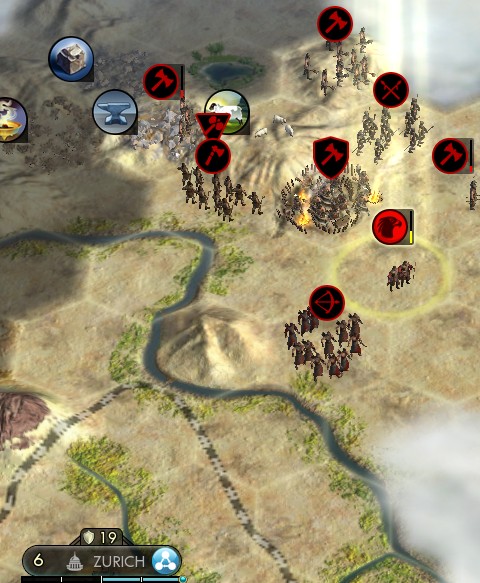
Sadly, that heroic scout perished soon after, tragicomically pursued and surrounded by every barbarian in the hemisphere!
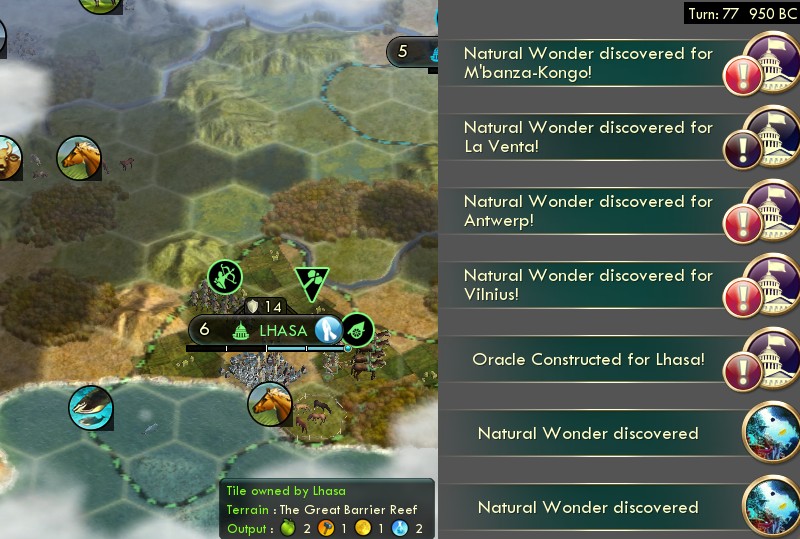
And here's a new version of the city-state quest cascade. I completed Oracle for Lhasa, which triggered them into alliance granting visibility on their territory... which just happened to reveal the Great Barrier Reef natural wonder, triggering nat wonder quests for four more city-states.
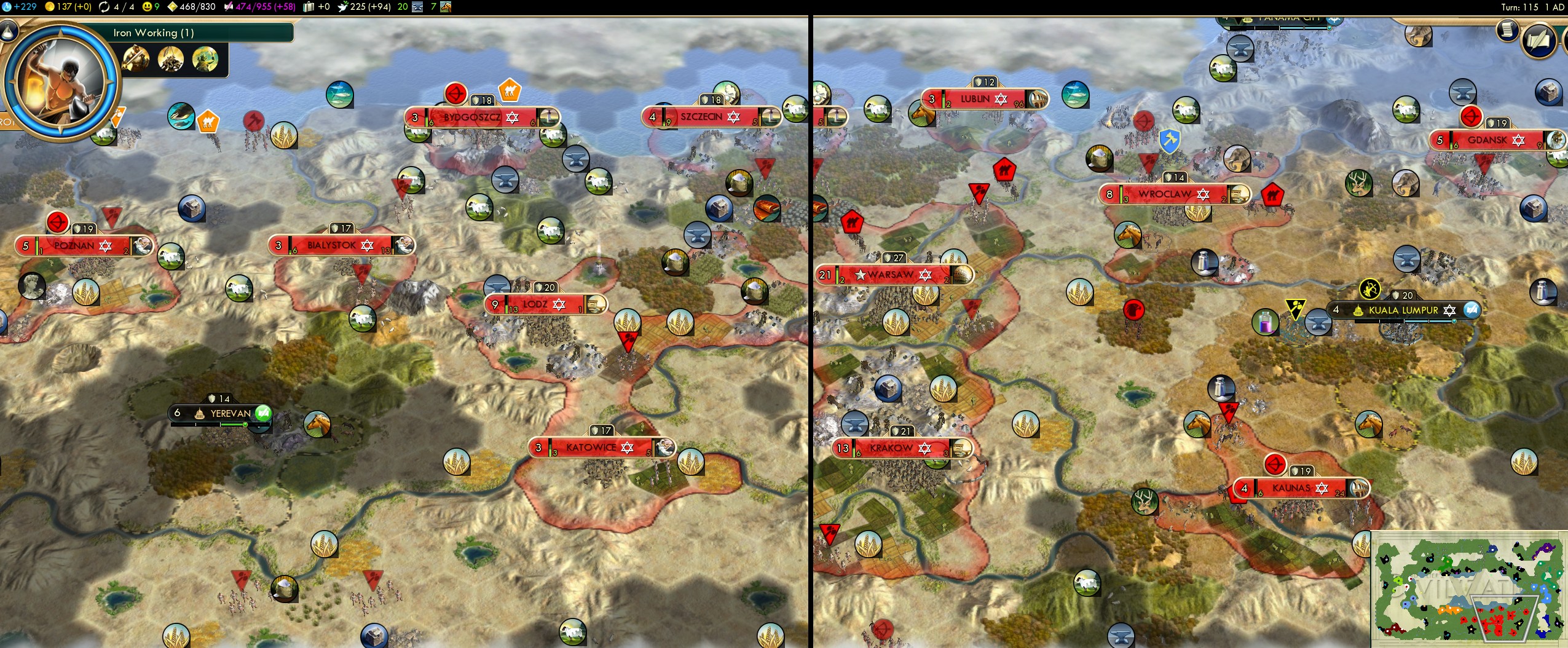
Time for the traditional 1 AD overview. 81 population at this date is on the low end; 100 is good for a Liberty game. But there's still room for growth. Including in the happy department, which looks a bit tight at only 9 to spare, but that's because I only got to buying half the pagodas before universities and more pagodas would come later.
Education came on turn 109, competitive with but not ahead of my fastest games. I had 700 faith saved for four universities right away and then of course filled in the rest as usual.
Mandate of Heaven came on turn 106, nicely timed just before buying the Jesuit universities (although the first several pagodas missed it.) I had time to backfill some techs (Engineering, Guilds, Optics) before entering the Renaissance at Acoustics.
Acoustics came on turn 124, timed along with the 9th regular social policy to take the Rationalism opener and Poland's freebie for Secularism right away, also as usual for Poland.
Printing Press turn 131, also a few turns slower than my best, but close enough that I'm still hoping Tradition might still have the juice to make that back up by the end of the game. (Although lacking the Liberty finisher for that Great Scientist will have an impact.)

What went right in this game was happiness. I went a very long time before ever having to halt cities on growth. I had enough happy headroom all game, from the pagodas and a lot of city-state luxuries, but what made a really big difference was Monarchy. Aristocracy less so, as only the four Tradition cities reached size 10 before the late game, but the capital did get to 20 soon and then even 30. For a few turns just before the modern age I did have to tap the brakes briefly in just a few cities, but then Universal Suffrage fixed everything in that department as usual.
I got this cool moment in the picture above: When does a city growing gain net happiness? When it's your capital growing such that the decimal via Monarchy means no additional anger and the size is a multiple of 10 so Aristocracy adds happy.
Turn 138 spent the first scientist bulb to reach Sci Theory on turn 139, again four turns behind my best. I had only 800 faith saved here for only two schools immediately. A problem in this game was that the faith production never really ramped up to the max. Other games had well over 200 faith per turn while this game was still only around 160 for a school every other turn. I had several cities only half-full of desert, and also temples came too late in those late-founded outer cities.
My best approach to mitigating that faith deficit was to have my best three cities (the Tradition Four minus the capital) actually just build their schools. That took about 12 turns each, but it would have taken 12 turns until accumulating faith for those three more schools, so there were no turns lost on that and two research labs worth of faith saved.
Sci Theory also meant the industrial age for Poland's next freebie, which was also timed along with the next regular policy to claim Humanism and Free Thought at the same time. (This is why Poland doesn't need to do Oracle - Rationalism. Free Thought would have come at this same time anyway. The Oracle only would have pushed into Sovereignty here, which can wait and was less important than getting to Mandate of Heaven pre-universities.)
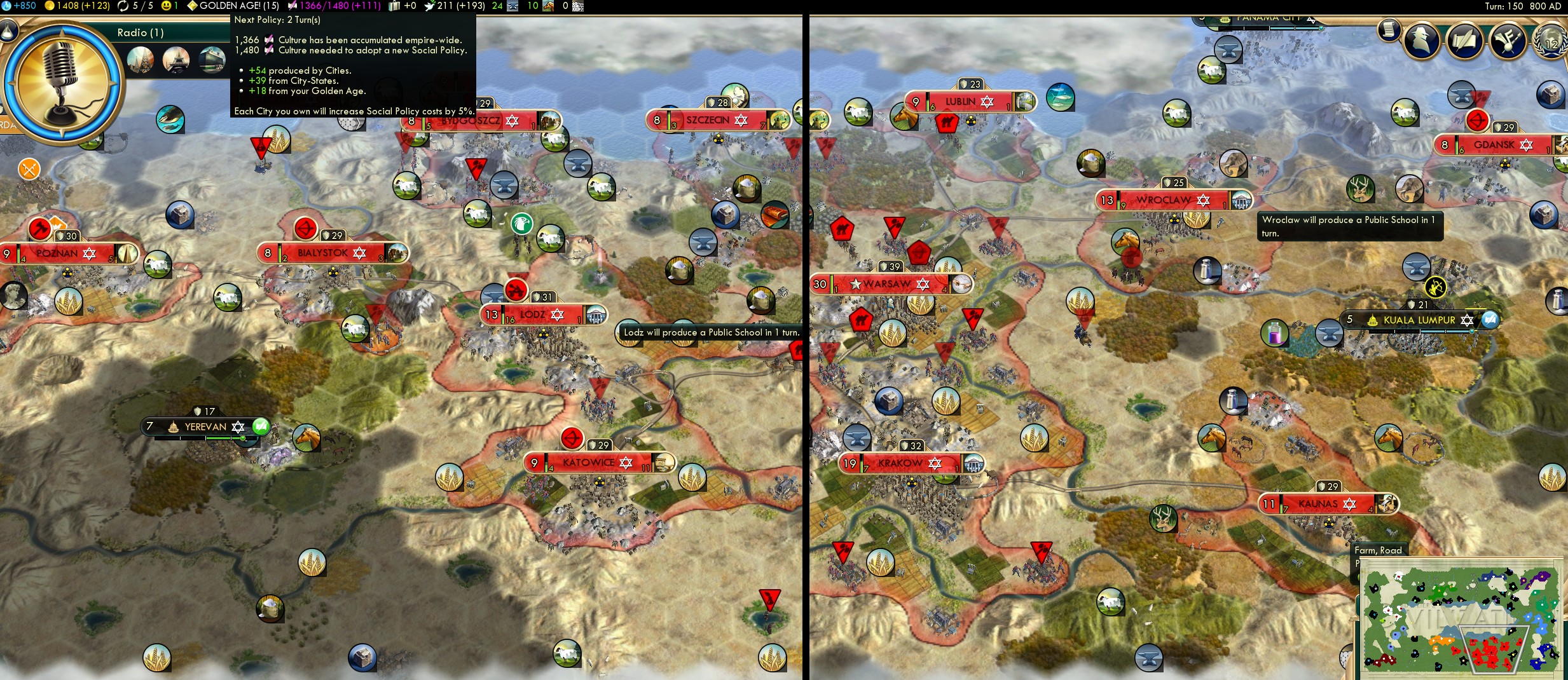
And my next usual overview at turn 150. 145 population and 850 beakers are not records either -- but another 100 was added after all three of those manually-built public schools completed at this turn roll.
Also notice the culture counter there. In a series of coincidences, every one of Poland's Solidarity freebies had come on the same turn as another policy. The medieval era had coincided with the Oracle, and all the others (classical, renaissance, industrial, modern) just happened to be synched up with a regularly scheduled policy. That happened again here but I actually intentionally sabotaged it by selling monuments to keep the culture under the threshold for an extra turn. The reason is that a policy earned on the same turn as entering the modern era can't go into your ideology; the ideology doesn't get founded until a turn cycle later. That means Poland's modern-era freebie can't be Universal Suffrage and went for Sovereignty in Rationalism instead. But the policy I delayed here did go for Uni Suffrage which corrected my anger problems for good.
I presently mined aluminum and bought Warsaw's hydro plant, which finally got the city's base production up over 40 hammers to make use of the shrine-rebuild trick described in earlier reports.
The endgame proceeded on a standard plan, nothing new here. Turn 161 and 162 I spent two bulbs to reach Plastics, with faith for 5 research labs right away. I kept buying research labs, but overlooked saving faith to buy an engineer in addition to the usual two scientists -- not used to being in Tradition to enable that, heh.
Poland's lategame free policies went into Theocracy (other civs can't spare a policy for this to finish Piety) and up to Mercantilism. The purchasing discounts would make it easy to buy the spaceship parts (I'm convinced Poland should always go Freedom over Order), and along the way also buy three research labs by cash.
The three Tradition cities after the capital were still substantially bigger and stronger and more developed than every other city, all throughout the game. Here in the end this worked perfectly to allocate those three cities to the late game wonders. There are three "offsides" wonders that can be built at leisure taking 20-30 turns in an average city and don't have to go in the capital: Globe Theater, Porcelain Tower, and Oxford University.
In the why-did-I-never-think-of-that-before department, I took Foreign Legion as the second level-2 Freedom tenet and used the units to go around seizing tribute from city-states. Also something I never noticed before: You can reuse the same aluminum for more than one spaceship part. Once you buy one and add it to the ship, the unit no longer exists so you get the aluminum back. That trick saved me a headache of scrambling for money to buy two recycling centers.
T167 bulb Dynamite, overflow to Railroad and Flight
T170 bulb Ballistics, overflow to Electronics and Navigation
T172 bulb both Radar and Rocketry, use Poland's information age freebie for the Rationalism finisher for Satellites, use modern era freebie for Theocracy, start Apollo, overflow to Archaeology

The limiting factor turned out to be waiting for one more city-spawned Great Scientist on turn 182. (Short by 3 GPP! Building that garden or public school one turn sooner would have saved a turn of finish date.) I had misjudged how far the rest of the scientists before that would go, thanks to having neither the Liberty finisher nor the third faith great scientist. Those are really important for Poland, that is their turn saver in the late game.
The endgame went smoothly at least, with no turn-losing hiccups. I claimed the Rationalism finisher fairly early and bought the faith scientists with plenty of time to burn their overflow into techs. (I think that should be a standard play. Waiting to use Rationalism for a last-column tech makes the faith scientists come too late and creates trouble in finding enough turn-ends to burn their overflow. Rationalism - Satellites is perfect, to start Hubble in parallel with Apollo. The difference in cost between Satellites and a last-column tech is only one turn's worth of normal beakers, and that turn gets overshot by the last scientist more often than not anyway.)
I built Porcelain Tower on the same turn as that last scientist, cleverly putting it in a city sequenced after the great scientist so both could spawn on the same turn. Turn 182 I bulbed those two scientists and also completed Oxford that same turn too for a last-column tech. Then I finished Hubble on 183. Hubble scientists are immediately available the same turn, unlike faith-purchased scientists, and were enough to entirely bulb the final two techs (this doesn't always happen - the last scientist isn't always enough to bulb the full 14k cost of the final tech and so you need one more end-turn to get it from overflow.) So I bought the last SS part on t183 and added it for the win on t184.

Turn 184 win, and short of turn 183 by just 3 GPP, hah. And if I could have gone without that one more spawned scientist, it would have been turn 179 and exactly the same as my last Poland game. This proves out the intuition I'd had about the social policy trees. Tradition and Liberty are just about equal strength throughout the game, except that the lategame Liberty finisher gives a great scientist to cut off a chunk of turns that Tradition can't match.